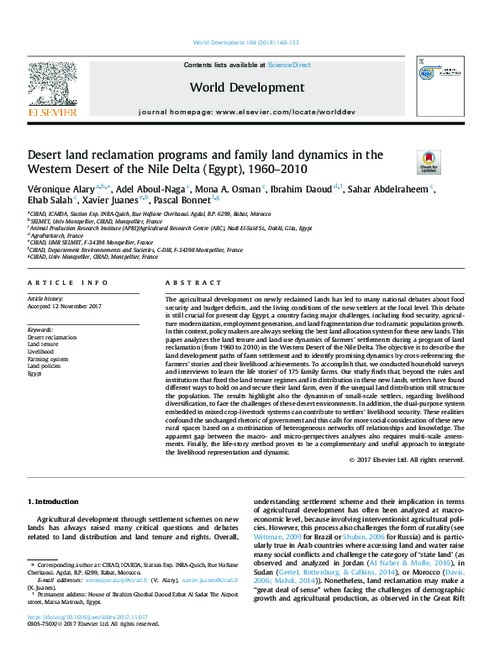Resource information
The agricultural development on newly reclaimed lands has led to many national debates about food
security and budget deficits, and the living conditions of the new settlers at the local level. This debate
is still crucial for present day Egypt, a country facing major challenges, including food security, agriculture
modernization, employment generation, and land fragmentation due to dramatic population growth.
In this context, policy makers are always seeking the best land allocation system for these new lands. This
paper analyzes the land tenure and land use dynamics of farmers’ settlements during a program of land
reclamation (from 1960 to 2010) in the Western Desert of the Nile Delta. The objective is to describe the
land development paths of farm settlement and to identify promising dynamics by cross-referencing the
farmers’ stories and their livelihood achievements. To accomplish that, we conducted household surveys
and interviews to learn the life stories’ of 175 family farms. Our study finds that, beyond the rules and
institutions that fixed the land tenure regimes and its distribution in these new lands, settlers have found
different ways to hold on and secure their land farm, even if the unequal land distribution still structure
the population. The results highlight also the dynamism of small-scale settlers, regarding livelihood
diversification, to face the challenges of these desert environments. In addition, the dual-purpose system
embedded in mixed crop-livestock systems can contribute to settlers’ livelihood security. These realities
confound the unchanged rhetoric of government and this calls for more social consideration of these new
rural spaces based on a combination of heterogeneous networks off relationships and knowledge. The
apparent gap between the macro- and micro-perspectives analyses also requires multi-scale assessments.
Finally, the life-story method proves to be a complementary and useful approach to integrate
the livelihood representation and dynamic.


